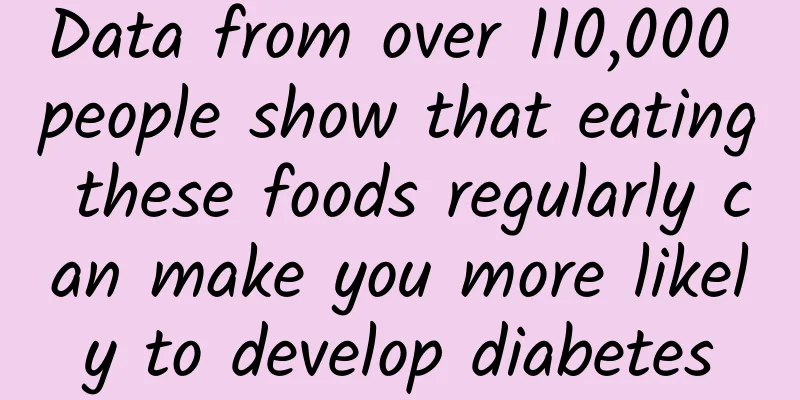Data from over 110,000 people show that eating these foods regularly can make you more likely to develop diabetes

|
Diabetes is a chronic disease that affects more than 540 million people worldwide. With changes in lifestyle and eating habits, diabetes has become the third largest factor affecting human health. In China, there are more than 114 million adults with diabetes, accounting for 1/4 of the world's diabetes patients. An unhealthy diet is one of the risk factors for diabetes . Early studies have shown that a healthy plant-based diet is associated with a lower risk of type 2 diabetes, and can also improve liver and kidney function and reduce inflammation. In contrast, an unhealthy plant-based diet is associated with a higher risk of type 2 diabetes. Recently, researchers from Queen's University Belfast in the UK published a research paper titled " A healthful plant-based diet is associated with lower type 2 diabetes risk via improved metabolic state and organ function: A prospective cohort study " in the journal Diabetes & Metabolism. The study showed that a healthy plant-based diet can reduce body fat, regulate blood sugar concentration, reduce inflammation levels, and improve liver and kidney function, thereby reducing the risk of type 2 diabetes. Healthy plant-based foods include fruits, beans, nuts, tea and coffee, vegetables, and whole grains. Intake of such foods can reduce the risk of diabetes by 24%. In this study, researchers analyzed 113,097 participants in the UK Biobank database, with an average age of 56 years and 57% women. The study collected information on 17 types of food diets from participants through questionnaires, analyzed the relationship between a healthy plant-based diet and the risk of type 2 diabetes, and explained the potential mechanisms. 17 food categories Healthy plant-based diet: fruits, legumes, nuts, tea and coffee, vegetables, whole grains. Unhealthy plant-based diet: Juice, potatoes, refined grains, sugary drinks, candies and desserts. Animal foods: meat, eggs, dairy products, animal fats, seafood or fish, other animal foods. Based on the participants’ diets, the researchers scored dietary patterns, ultimately creating healthy and unhealthy plant-based diet scores. During an average follow-up of 12 years, a total of 2628 cases of type 2 diabetes were recorded. The study found that for a healthy plant-based diet, participants in the highest quartile had a 24% lower risk of developing type 2 diabetes compared with participants in the lowest quartile. In contrast, for an unhealthy plant-based diet, participants in the highest quartile had a 37% increased risk of developing type 2 diabetes compared with participants in the lowest quartile (Figure 1). Figure 1 Healthy and unhealthy plant-based diets and diabetes risk In addition, the researchers also analyzed the participants' blood lipids (triglycerides), blood sugar (HbA1c), inflammatory parameters, and insulin-like growth factor. Mediation analysis revealed that body mass index (BMI) and waist circumference were the strongest mediators of the association between a healthy plant-based diet and type 2 diabetes, accounting for 28% each, followed by HBA1c (11%), triglycerides (9%), and alanine aminotransferase (5%). However, higher BMI, triglycerides, and waist circumference showed a mediating effect in the association between an unhealthy plant-based diet and type 2 diabetes, mediating 7%, 13%, and 17% of the development of type 2 diabetes, respectively. The study pointed out that in this large study, regardless of genetic risk or other risks, a healthy plant-based diet was consistently associated with a reduced risk of type 2 diabetes , an association that was partly mediated by a lower BMI and was also associated with better glucose metabolism, lower inflammation, and better liver and kidney function. Studies have shown that a healthy plant-based diet, including fruits, legumes, nuts, tea and coffee, vegetables, and whole grains, is associated with a lower risk of type 2 diabetes. In terms of mechanisms, in addition to being associated with lower BMI and blood sugar, it is also associated with improved liver and kidney function and reduced inflammation. |
<<: What is the "zombie deer" virus? ——What is "prion disease"?
>>: Does neck pain require massage?
Recommend
What causes sore feet during pregnancy?
In fact, pregnant women often experience limb pai...
Gynecological disease uterine prolapse how to do
Speaking of gynecological diseases, I believe eve...
What to do if urine protein is high during pregnancy
Being able to give birth to a healthy baby is a v...
Why is my nipple itchy?
Itchy nipples may be a common experience for many...
Is curettage necessary for thick endometrium?
Whether it is necessary to perform curettage if t...
A woman dreams of a little girl
Many mothers hope to give birth to girls, because...
How to make lemon chicken feet delicious? How to preserve lemon chicken feet
Lemon chicken feet taste sweet and sour. Eating t...
The mother-in-law didn’t turn on the air conditioner, causing a pregnant woman to get heatstroke and be sent to the hospital. At what temperature should the air conditioner be turned to save electricity and be healthy?
The summer solstice is approaching, and the tempe...
How many days of bleeding after miscarriage
Pregnancy itself is a very happy thing, but becau...
How to make the follicles grow
There are many abnormal conditions in follicles, ...
What nutrients do whole grain foods contain? What are whole grain foods?
In our daily life, we often see cereals, whole wh...
How to eat red wolfberry? How to choose wolfberry
Diet therapy is quite popular, and wolfberry is o...
Can I drink saffron if I have light menstrual flow?
Although rose tea is more nourishing and can take...
Is there any way to really reduce stretch marks?
As women, we have to accept pregnancy, but pregna...






![[Medical Q&A] My child always looks at things with his eyes squinting. Is this a big deal?](/upload/images/67f0f056e2d51.webp)


